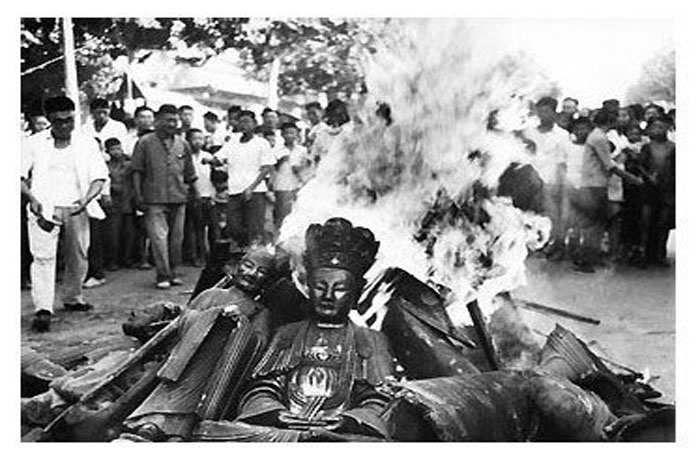 Dharamshala: In 2011, the spiritual leader of Tibet, His Holiness the Dalai Lama reiterated his belief that China is committing a form of 'cultural genocide'* in Tibet: consciously, deliberately and with intent. However, totaliatarian states, or even democratic ones for that matter, rarely signal their intent to commit genocide-cultural, economic or otherwise in actual overt policies.
Dharamshala: In 2011, the spiritual leader of Tibet, His Holiness the Dalai Lama reiterated his belief that China is committing a form of 'cultural genocide'* in Tibet: consciously, deliberately and with intent. However, totaliatarian states, or even democratic ones for that matter, rarely signal their intent to commit genocide-cultural, economic or otherwise in actual overt policies.
Even Nazi Germany did not (the Nazis were careful in using appropriate euphemisms- 'evacuation' 'resettlement' 'final solution'), and China, which has learned the value of how mass communication can also deceive and manipulate, is no different.
Of course, in retrospect, we can discern the true intent of genocidal actions-the well organised massacre of Tutsis by Hutu miltia groups in Rwanda in 1994 is the most modern and horrific example. Yet even that Genocide was preceded by Hutu power ideologies; in other words, it was being flagged covertly, if not overtly. That is, if the world bothers to look, the warning signs are often there.
As a working and functional definition Cultural genocide can be defined as: the deliberate destruction, with intent, of an ethnic, religious or social group. For example, the elimination of indigenous languages, customs and beliefs.
Interestingly, cultural genocide as a concept is 'missing' from the 1948 UN Convention on Genocide, and this has beeen a source of some controversy ever since, it is notoriously difficuilt to prove ''intent to destroy''-then and now. For instance, cultural distinctiveness can be eradicated, yet the group still survives. The contemporary Tibetan story is a case in point.
In Tibet, Buddhist Monasteries have been destroyed, or more recently severely curtailed as places of religious freedom; intellectuals, writers and cultural figures have been silenced, tortured, and often worse; and, perhaps more worryingly for the future of Tibetan culture, most of the education system is conducted in the Chinese language.
Tibetan singers routinely sing saccherine pop songs on Tibetan and Chinese TV stations. Is this authentic Tibetan cultural expression or a cynical 'disneyfication' of Tibetan culture for outside consumption by others?.
In April, 2012 the International Campaign for Tibet (ICT), a Tibetan support group in the US stated that ''Chinese policies and practices of cultural repression and destruction are so systematic and persistent in Tibet, and their effects are so serious, that they contain elements of cultural genocide.''
Professor Ben Kiernan of Yale University, and the Director of Genocides Studies Program, states that motivation is often hidden for Genocide by states, and couched in the language of progress and development, ancient notions of racial purity, and/or saving a designated ethnic or social group-for example, serfs in Tibet in the 1950's during the Chinese invasion.
In reality however they are conquering territory, seizing wealth, appropriating resources and expanding living space. The rest is, in effect, mostly propaganda to justify aggressive state actions.
To conclude, it is worth asking the question: is there some form of 'cultural genocide' taking place within Tibet?
For sure their is a good argument for cultural destruction and the imposition of Chinese cultural hegemony upon the Tibetans. The evidence suggests that even if we think that it is not 'cultural genocide' now, the warning signs are most definitely flashing.
*Cultural genocide' in quotation marks because legally, under International Law, it is not yet a fully recognised legal norm. Meaning, it is not codified under law as for example Crimes against Humanity are.


![Tibet has a rich history as a sovereign nation until the 1950s when it was invaded by China. [Photo: File]](/images/stories/Pics-2024/March/Tibet-Nation-1940s.jpg#joomlaImage://local-images/stories/Pics-2024/March/Tibet-Nation-1940s.jpg?width=1489&height=878)















